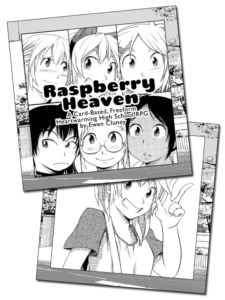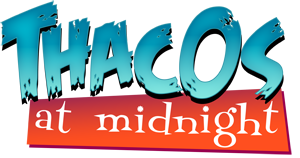While at Metatopia 2016, I bumped into the amazing Modern Myths vendor booth. I had been to one of their physical stores back around JiffyCon and used it as an opportunity to pick up a bunch of oddball gaming items that I didn’t want to foot shipping for. Mailing gaming products to Canada is can be frustrating.
This, though, was Metatopia and my head was in a different space than JiffyCon. I had done a lot of self-reflection about my past and present in the gaming industry leading up to the convention. The booth’s pile of Books About Role Playing Games, for lack of any better term, spoke to me in that moment and I promptly whipped out my wallet. I was here, the books were here and to hell with paying shipping to an online vendor later.
The first book I started reading from the pile was Ewen Cluney’s Yaruki Zero: Collected Thoughts on Role-Playing Games. I’ve been a fan of Cluney since his Golden Sky Stories translation project. While he isn’t the creator of the game, his discussions and sidebars expand out the game’s themes and ideas. This is particularly true in the game’s English expansions, Faerie Skies and Fantasy Friends.
Yaruki Zero is a bit odd in the spectrum of “Books About Role Playing Games”. It’s a very casual book; a collection of edited and expanded articles from Cluney’s blog. The topics tend to be a little bit all over the place. Cluney makes an attempt to gather slightly related articles by section, but the articles should be taken as individual pieces of writing and not working towards a central thesis.
The content is slightly out of date by today’s industry standards. A lot of focus is given to Maid’s translation and release and then-current discussion around Dungeons and Dragons 4th Edition. Projects that were then in development have since been released, such as the English version of Golden Sky Stories and Raspberry Heaven.

Honestly, if you are going to make a RPG based on Macross, it should use Ribbon Drive as the system.
One of the most valuable takeaways are the short articles on Cluney’s first exposure to role playing games and how that shaped his approach to the hobby. Cluney entered the hobby through Palladium’s Robotech system instead of a more “traditional” route. This approach gives him a slightly different perspective on developments of the RPG community. Cluney’s commentary on Palladium isn’t all of idealized nostalgia and he has plenty of healthy criticisms for the games of his youth.
One section is focused on Dungeons & Dragons. There’s a certain level of detachment that Cluney has while talking about Dungeons & Dragons and the online fan community. While being objective is not necessarily a better approach to a topic, it’s does allow for different insights in how the community reacted to 3th, 3.5 and 4th editions. It’s refreshing to read about D&D from a place that isn’t fiery passion.
There are similar articles on Palladium and Guardians of Order, mostly focusing on Western Anime RPG development. The context that these articles gave was revealing. I wasn’t part of the RPG community while it was trying to branch into anime-style storytelling. Instead, I entered the RPG hobby post-Western Anime Bubble and was generally confused by the Anime RPG artifacts left behind.
The sections on how to run games are short but have some strong thoughts buried in him. Cluney prefaces his GM discussions by touching on his mild cognitive issues, namely in that he can only handle so much incoming information at once, and discusses how he manages that in a GMing environment. These articles are only a small section of the book, however, and could have been expanded out in more detail.
Finally, the book contains a collection of half-finished gaming thoughts, daydreams and ideas. The two standouts here were Raspberry Heaven and Seasons.
Raspberry Heaven is a RPG about girls in highschool that has since been published. The version of Raspberry Heaven discussed in Yaruki Zero is a much earlier prototype. Cluney talks in the book about considering a smartphone app to support the game. That idea clearly didn’t carry over into the final, card-and-dice based system that was heavily informed by freeform games. Another of the mini-games in the back of the book, Monday Afternoon Blues, is an early exploration into Nordic Freeform; it’s a quick (15 minute) LARP about convention attendees trying to cope with con crash. I can’t help but wonder if the creation of Monday Afternoon Blues influenced the final version of Raspberry Heaven, given the latter’s use of structured freeform scenes.
Seasons, the second game of note, is an attempt to play with the storytelling style of Jun Maeda. I find Maeda’s unique takes on Urban Fantasy compelling but not compatible with many games on the market. There’s not a lot of systems that allow for a combination of creeping dread and wonder in the same breath. Season’s structure tries to create that space by escalating tension through exploring PC’s back stories. It’s not quite a complete mini RPG, but it’s a starting point for considering how a game can challenge a player’s emotional focus.
It’s hard to recommend Yaruki Zero as an important “Books About Role Playing Games” book to the average person. I greatly enjoyed reading it, but found that it didn’t have much direction on any one part of the hobby. The content is not unlike reading a bunch of blog posts (which was the original form of most of the articles) or listening to a podcast; it’s the memoirs of another member of the community during a certain time and place. It’s possible to find information and tips on improving your own gaming experiences, but will require thoughtful reading on the part of the reader.


